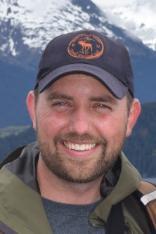Wheaton BHS faculty are engaged in exciting research that intersects with a variety of related disciplines including botany, ecology, psychology, microbiology, zoology and more.
Dr. Vanya Tepavčević
Microbiologist
Dr. Tepavčević studies how bacteria regulate gene expression at the post-transcriptional level. She uses a marine bacterium, Vibrio fischeri, an exclusive symbiont of the Hawaiian bobtail squid, Euprymna scolopes, as a model system to investigate how small non-coding RNAs (sRNAs) and their chaperones regulate gene expression. Specifically, the lab is looking at the regulation of processes required for Vibrio colonization of the squid light organ, including motility, biofilm formation and bioluminescence.
Dr. Raymond J. Lewis
Botanist
Dr. Lewis' research involves characterizing factors such as salinity, nutrients, pH and pheromones, that control the growth and reproduction of the large marine brown algae known as kelps.
Dr. L. Kristen Page
Ecologist
Dr. Page’s research involves answering questions about how diseases are transmitted, and trying to understand how disease transmission changes as humans alter landscapes and habitats. Many of the projects conducted with her research students investigate the transmission dynamics of raccoon roundworm in urban landscapes.
Dr. Nathaniel Thom
Neurobiologist
Dr. Nathaniel Thom is interested in modifying factors that promote an adaptive response to stress. More specifically, he uses psychophysiological and neuroimaging methods to better understand how physical and mental training programs alter brain-behavior relationships in ways that promote a healthy response to and recovery from stress. Dr. Thom’s research evaluating interventions to promote physical activity, has also provided an interest in advanced statistical techniques including meta-regression and structural equation modeling, which he employs when analyzing brain imaging data.
 Dr. Brian Hunt
Dr. Brian Hunt
Systems Physiologist
Dr. Brian Hunt’s research focuses on factors that affect cardiovascular and pulmonary function, such as diet, sleep, or loss of limb.
 Dr. Dana Townsend
Dr. Dana Townsend
Human Anatomy and Physiologist
Dr. Townsend’s research involves identifying insulin resistance (IR), prior to a Type 2 diabetic or pre-diabetic, medical diagnosis, in healthy, young adults. Decremental effects on capillary function and brachial artery reactivity, both which portend future cardiovascular disease, have been explored in this early stage of IR.
 Dr. Meredith Sommars
Dr. Meredith Sommars
Geneticist
Dr. Sommars' research seeks to understand the role of transcription factor proteins in regulating gene expression programs. Specifically, she uses molecular, cell, genetic, and bioinformatic approaches to study the dynamics of gene expression in liver homeostasis and disease progression.

Conservation Biologist
Dr. Rosenberger's research focuses on animal conservation in endangered ecosystems such as tallgrass prairies and tropical forests. His lab works primarily with insects (pollinators and beetles), and birds to determine how biodiversity can be preserved or restored.
 Dr. Corbin Renken
Dr. Corbin Renken
Neurology/Cell Biologist
Dr. Renken's laboratory studies the cell
biology of neurons using the nematode roundworm C. Elegans as a model system, with particular emphasis on organelle trafficking, mitochondrial physiology, localized protein synthesis, and synaptic plasticity.